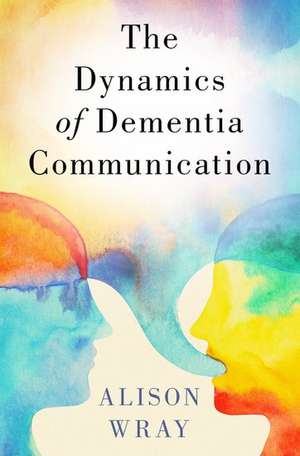The Dynamics of Dementia Communication
Autor Alison Wrayen Limba Engleză Hardback – 15 iul 2020
Preț: 779.69 lei
Preț vechi: 1012.59 lei
-23% Nou
Puncte Express: 1170
Preț estimativ în valută:
149.24€ • 162.16$ • 125.44£
149.24€ • 162.16$ • 125.44£
Carte disponibilă
Livrare economică 31 martie-14 aprilie
Preluare comenzi: 021 569.72.76
Specificații
ISBN-13: 9780190917807
ISBN-10: 0190917806
Pagini: 352
Dimensiuni: 236 x 152 x 23 mm
Greutate: 0.61 kg
Editura: Oxford University Press
Colecția OUP USA
Locul publicării:New York, United States
ISBN-10: 0190917806
Pagini: 352
Dimensiuni: 236 x 152 x 23 mm
Greutate: 0.61 kg
Editura: Oxford University Press
Colecția OUP USA
Locul publicării:New York, United States
Recenzii
This author's commitment to person-centered care, specifically addressing the person living with a dementia as well as the challenges and needs of the caregiver, can only be described as exceptional...Highly recommended. Upper-division undergraduates. Graduate students, faculty, and professionals.
...ambitious, original, comprehensive and thoughtful...
Alison Wray has taken our understanding about the social and communicative aspects around Alzheimer's dementia several steps forward with this book. Her volume offers a most nuanced discussion about communicating with people that have this dementia and a most up-to-date review of scholarship on the social aspects of this condition. It is very much a must-read for any serious scholar in linguistics, communication, and dementia."
Professor Wray's excellent and stimulating book could become the 'go to' resource for in-depth discussions about language, linguistics, communication, and brain changes associated with particular types of dementia. Complex issues are thoughtfully presented and explained in a clear, compelling narrative. The text is scholarly without being stuffy or pedantic, and Parts and Chapters can be read as individual units of interest. Wray obviously has a working knowledge of communication and relationships with people living with a dementia, their caregivers, and professional partners. The warmth, humour, and expertise invite us to join in the explorations alongside the author. She invites us to ponder our own knowledge and assumptions and improve our person-centred practice. We couldn't ask for much more from a book in this field."
In this thought-provoking book Wray challenges us to move away from a singular focus on the myriad ways in which discourse can be shaped by dementia toward a reconsideration of these effects against the backdrop of communication more generally. Especially refreshing is her intricate discussion of the impact of understanding individuals living with dementia as being 'different in degree' vs. 'different in kind' from their healthy interactional partners. An invigorating read for anyone who reaches across disciplines at the intersection of dementia and communication."
Pinning down 'dementia communication' is notoriously difficult, and there is tension between individual variation in behaviours and symptoms and the call for, as it were, instructional manuals on how to communicate effectively in the context of dementia. Wray achieves a synthesis of solid theoretical foundations with practical information that will inform health care and eldercare practice and stimulate further research. Central to Wray's arguments is a model of communicative impact, defined as an individual's success in using communication to make desired changes in the world through the agency of others. A key message that cannot be emphasized enough is that "communication is not an optional extra" but rather that real communication, which allows persons with dementia to achieve communicative impact, is of the utmost importance for their well-being."
Wray's development of the Communicative Impact model emphasizes what speakers seek to do or to change in their social environments through their talk. She offers intriguing insights into how persons with dementia may be working out the meaning of what is said to them, picking through their available linguistic resources to craft an effective and appropriate response, or interiorly debating about how their contributions might be heard. Nevertheless, despite their well-intentioned mutual decipherment, both parties sometimes misfire, and misconstruals are not uncommon. Wray offers a series of novel concepts that capture the complexity (and humanity) of communication in dementia. Based on wide-ranging scholarship and deep reflection, this book opens new pathways for improving communication. More than an intellectual tour-de-force, it is an act of compassion."
...ambitious, original, comprehensive and thoughtful...
Alison Wray has taken our understanding about the social and communicative aspects around Alzheimer's dementia several steps forward with this book. Her volume offers a most nuanced discussion about communicating with people that have this dementia and a most up-to-date review of scholarship on the social aspects of this condition. It is very much a must-read for any serious scholar in linguistics, communication, and dementia."
Professor Wray's excellent and stimulating book could become the 'go to' resource for in-depth discussions about language, linguistics, communication, and brain changes associated with particular types of dementia. Complex issues are thoughtfully presented and explained in a clear, compelling narrative. The text is scholarly without being stuffy or pedantic, and Parts and Chapters can be read as individual units of interest. Wray obviously has a working knowledge of communication and relationships with people living with a dementia, their caregivers, and professional partners. The warmth, humour, and expertise invite us to join in the explorations alongside the author. She invites us to ponder our own knowledge and assumptions and improve our person-centred practice. We couldn't ask for much more from a book in this field."
In this thought-provoking book Wray challenges us to move away from a singular focus on the myriad ways in which discourse can be shaped by dementia toward a reconsideration of these effects against the backdrop of communication more generally. Especially refreshing is her intricate discussion of the impact of understanding individuals living with dementia as being 'different in degree' vs. 'different in kind' from their healthy interactional partners. An invigorating read for anyone who reaches across disciplines at the intersection of dementia and communication."
Pinning down 'dementia communication' is notoriously difficult, and there is tension between individual variation in behaviours and symptoms and the call for, as it were, instructional manuals on how to communicate effectively in the context of dementia. Wray achieves a synthesis of solid theoretical foundations with practical information that will inform health care and eldercare practice and stimulate further research. Central to Wray's arguments is a model of communicative impact, defined as an individual's success in using communication to make desired changes in the world through the agency of others. A key message that cannot be emphasized enough is that "communication is not an optional extra" but rather that real communication, which allows persons with dementia to achieve communicative impact, is of the utmost importance for their well-being."
Wray's development of the Communicative Impact model emphasizes what speakers seek to do or to change in their social environments through their talk. She offers intriguing insights into how persons with dementia may be working out the meaning of what is said to them, picking through their available linguistic resources to craft an effective and appropriate response, or interiorly debating about how their contributions might be heard. Nevertheless, despite their well-intentioned mutual decipherment, both parties sometimes misfire, and misconstruals are not uncommon. Wray offers a series of novel concepts that capture the complexity (and humanity) of communication in dementia. Based on wide-ranging scholarship and deep reflection, this book opens new pathways for improving communication. More than an intellectual tour-de-force, it is an act of compassion."
Notă biografică
Alison Wray took her BA and D.Phil in linguistics at the University of York, UK. After completing a postdoctoral research project on singers' pronunciation in the Department of Music at York, she held a lectureship in linguistics at the then College of Ripon and York St John (now York St John University). In 1996 she was appointed Assistant Director of the Wales Applied Language Research Unit at Swansea University, and in 1999 became a Senior Research Fellow at Cardiff University. She became a (full) Professor at Cardiff in 2005 and a Research Professor in 2007. She is internationally known for her research into formulaic language, publishing two seminal books on the topic in 2002 and 2008. Since 2008 she has focussed on understanding the challenges of communication by and with people living with a dementia and has presented on this topic in countries around the world.























